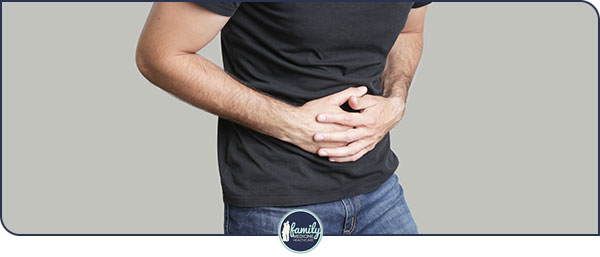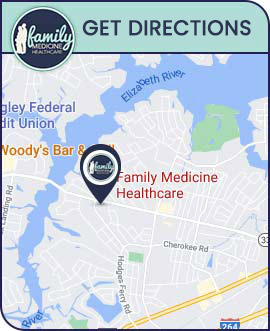Urgent Care for Abdominal Pain in Chesapeake, VA
Our team at Family Medicine Healthcare provides urgent care for abdominal pain, offering fast, thorough evaluations and treatment to address your symptoms. We’re committed to delivering compassionate care in a comfortable setting. For more information, please contact us today or simply book an appointment. We are conveniently located at 3925 Portsmouth Boulevard, Chesapeake, VA 23321.


Table of Contents:
What are the signs of appendicitis, and why is it a medical emergency?
How can food intolerances or allergies cause pain in the lower abdomen?
How can a sexually transmitted infection (STI) lead to lower abdominal pain in women?
What are the signs and symptoms of a kidney stone, and can the pain radiate to the lower abdomen?
At Family Medicine Healthcare, we understand that abdominal pain can be concerning, especially when it may signal a serious condition like appendicitis. Appendicitis is an inflammation of the appendix—a small pouch attached to the large intestine—and is considered a medical emergency.
Our experienced family medicine providers are trained to recognize the classic symptoms of appendicitis, which often begin as pain near the navel and then shifts to the lower right side of the abdomen. The pain can become more severe over time. You may also experience loss of appetite, nausea, vomiting, and a low-grade fever. Some patients report abdominal swelling, difficulty passing gas, constipation, or diarrhea. It’s important to note that symptoms can vary, especially in young children, pregnant women, or older adults.
Prompt evaluation is crucial because an inflamed appendix can rapidly worsen, leading to rupture and potentially life-threatening complications like peritonitis (infection of the abdominal cavity) or sepsis. At Family Medicine Healthcare, we are committed to early recognition and timely referral for surgical care when appendicitis is suspected.
We understand that abdominal pain can significantly impact your quality of life, especially when it comes after eating certain foods. Two common culprits behind lower abdominal pain are food allergies and food intolerances, but they affect your body in different ways.
Food Allergies:
A food allergy occurs when your immune system mistakenly identifies a specific food protein as dangerous. This triggers an immune response, releasing chemicals like histamine that cause inflammation in your digestive tract. As a result, you may experience cramping, pain, nausea, vomiting, diarrhea, or even more severe reactions. Food allergies can be serious, and it’s important to recognize their symptoms early.
Food Intolerances:
Unlike allergies, food intolerances do not involve the immune system. Instead, they happen when your digestive system has trouble breaking down certain food components, such as lactose in dairy. These undigested substances are fermented by gut bacteria, producing gas and other byproducts that can stretch the intestinal walls. This leads to bloating, pressure, and lower abdominal pain. Food intolerances can also cause changes in your bowel habits, like diarrhea or constipation.
Both food allergies and intolerances can disrupt your digestive health and overall well-being. At Family Medicine Healthcare, our experienced providers are here to help you identify the root cause of your symptoms. We offer comprehensive evaluation, diagnostic testing, and personalized management plans to help you feel your best.If you frequently experience lower abdominal pain after eating, don’t ignore it.
At Family Medicine Healthcare, we understand that lower abdominal pain in women can be caused by a variety of conditions, including sexually transmitted infections (STIs). STIs—such as chlamydia and gonorrhea—can sometimes lead to a serious complication called pelvic inflammatory disease (PID). This occurs when bacteria from the infection spread from the vagina and cervix to the upper reproductive organs, like the uterus, fallopian tubes, and ovaries.
When this happens, the body’s immune response causes inflammation and swelling in the pelvic region, leading to lower abdominal pain. This pain can range from mild discomfort to severe cramping. Other symptoms may include abnormal vaginal discharge, bleeding between periods, pain during intercourse, or fever.
Our experienced providers are committed to early detection and treatment of STIs and PID to help prevent long-term complications such as chronic pelvic pain, infertility, or ectopic pregnancy. If you are experiencing lower abdominal pain—especially if you have other symptoms of an STI—we encourage you to schedule an appointment. Prompt evaluation and care can make a significant difference to your reproductive and overall health.
Kidney stones are hard deposits that form in the kidneys and can cause a range of symptoms, often beginning when the stone moves into the ureter—the tube connecting the kidney to the bladder. One of the hallmark signs of a kidney stone is sudden, severe pain, typically starting in the back or side just below the ribs. This pain, known as renal colic, can come in waves and may change in intensity. As the stone moves through the urinary tract, the pain can radiate toward the lower abdomen and groin. In other words, lower abdominal pain can sometimes be caused by a kidney stone.
Other common symptoms include an urgent or frequent need to urinate, a burning sensation during urination, and urine that may appear pink, red, or brown due to blood. Some people may notice cloudy or foul-smelling urine. Nausea and vomiting can also occur, especially with severe pain. If a stone causes a blockage or leads to infection, symptoms such as fever and chills may develop—these require prompt medical attention.
Our providers are trained to evaluate and manage symptoms of kidney stones. We can help determine the severity of your symptoms, order appropriate tests (such as urine analysis or imaging), and guide you on the best course of treatment. While small stones may pass with minimal discomfort, larger stones can cause more intense symptoms and may need medical intervention. For more information, please contact us today or simply book an appointment. We are conveniently located at 3925 Portsmouth Boulevard, Chesapeake, VA 23321. We serve patients from Chesapeake VA, Portsmouth VA, Norfolk VA, Suffolk VA, Virginia Beach VA, and Hampton VA.








